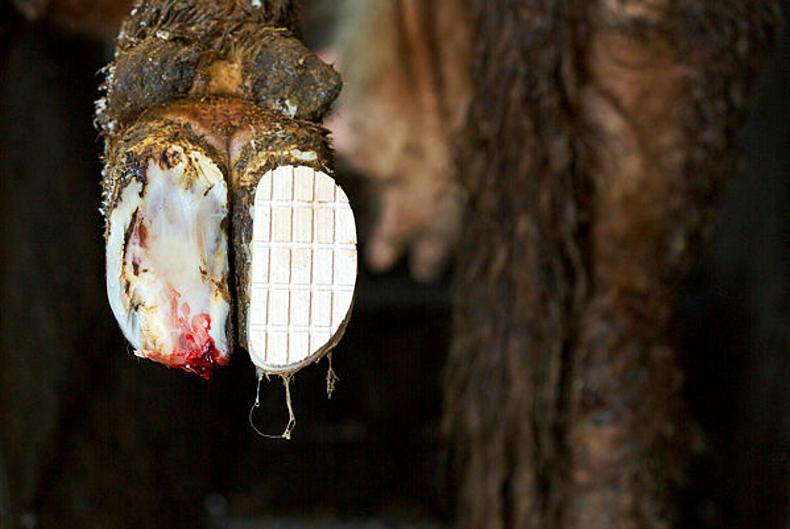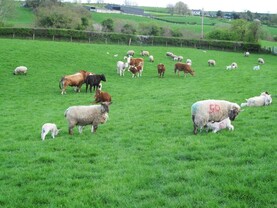The number of cows recorded for data on mastitis and lameness has seen a fivefold reduction following the end of the dairy efficiency programme (DEP).
According to the ICBF, approximately 3,500 herds were recording cases of mastitis and lameness for an average of 52,000 cows every year.
Breed replacements using sires which are genetically more resistant
Since the DEP ended in 2014, that has fallen to 10,500, which it says is “a significant drop-off in the level of data being recorded”.
Based on figures from Animal Health Ireland (AHI), the cost of mastitis for a herd averaging 300,000 to 400,000 cells/ml is estimated at €186/cow/year. This amounts to a €18,600 reduction in profit for a 100-cow herd.
For lameness, the average case cost is estimated at €300, once treatment costs and loss of production are taken into account.
Breed resistance
An ICBF statement said: “One way to improve mastitis and lameness in the herd is to breed replacements using sires which are genetically more resistant to these diseases.”
Research from the Irish Veterinary Journal has shown resistance to mastitis and lameness both have heritabilities similar to that of calving interval.
Owing to the genetic variability in the national herd, the ICBF said it is achievable to select for genetically healthier cows.
However, the research also said the main challenge when selecting animals for mastitis and lameness resistance is around the quantity of data being recorded.
Recording
To combat the reduction in data recorded, the ICBF has sent surveys to over 8,000 dairy herds.
These surveys are designed to allow farmers record mastitis, lameness and milking temperament in a quick and easy manner.
The ICBF said: “The EBI has already delivered an estimated €587m in additional profit to the sector, primarily through gains in milk and fertility.
"Recording this health and temperament information will help improve the reliability of the health and management sub-indices of the national herd and will better place the Irish dairy sector to select the next generation of high-health easy-management AI sires which will ultimately leave more profit for Irish dairy farmers in the future.”
Read more
Listen: sexed semen disappoints, but still hope
Stamp out the spread of infectious lameness in your herd
The number of cows recorded for data on mastitis and lameness has seen a fivefold reduction following the end of the dairy efficiency programme (DEP).
According to the ICBF, approximately 3,500 herds were recording cases of mastitis and lameness for an average of 52,000 cows every year.
Breed replacements using sires which are genetically more resistant
Since the DEP ended in 2014, that has fallen to 10,500, which it says is “a significant drop-off in the level of data being recorded”.
Based on figures from Animal Health Ireland (AHI), the cost of mastitis for a herd averaging 300,000 to 400,000 cells/ml is estimated at €186/cow/year. This amounts to a €18,600 reduction in profit for a 100-cow herd.
For lameness, the average case cost is estimated at €300, once treatment costs and loss of production are taken into account.
Breed resistance
An ICBF statement said: “One way to improve mastitis and lameness in the herd is to breed replacements using sires which are genetically more resistant to these diseases.”
Research from the Irish Veterinary Journal has shown resistance to mastitis and lameness both have heritabilities similar to that of calving interval.
Owing to the genetic variability in the national herd, the ICBF said it is achievable to select for genetically healthier cows.
However, the research also said the main challenge when selecting animals for mastitis and lameness resistance is around the quantity of data being recorded.
Recording
To combat the reduction in data recorded, the ICBF has sent surveys to over 8,000 dairy herds.
These surveys are designed to allow farmers record mastitis, lameness and milking temperament in a quick and easy manner.
The ICBF said: “The EBI has already delivered an estimated €587m in additional profit to the sector, primarily through gains in milk and fertility.
"Recording this health and temperament information will help improve the reliability of the health and management sub-indices of the national herd and will better place the Irish dairy sector to select the next generation of high-health easy-management AI sires which will ultimately leave more profit for Irish dairy farmers in the future.”
Read more
Listen: sexed semen disappoints, but still hope
Stamp out the spread of infectious lameness in your herd






 This is a subscriber-only article
This is a subscriber-only article









SHARING OPTIONS: